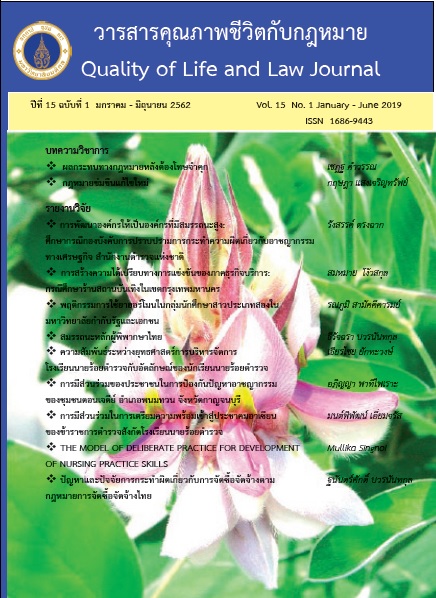THE MODEL OF DELIBERATE PRACTICE FOR DEVELOPMENT OF NURSING PRACTICE SKILLS
Main Article Content
Abstract
Research Design of this study was systematic review. The purpose was to study the model of deliberate practice for development of nursing practice skills. The study procedure was shown as followed: 1) Search for evidence-based research, the researcher used the PICO framework to search for research data related to deliberate practice in undergraduate nursing students between 2008 and 2018 from the electronic databases, for example, Academic Search Complete, PubMed, ProQuest Nursing & Allied Health Source, CINAHL, 2) Assessing the level of reliability of empirical evidence, 3) Analyzing the evaluation of the quality of empirical evidence.
Research results found nine qualified research studies, which were analyzed and synthesized for recommendations with the following main issues: 1) Using of deliberate practice for nurse assistants and nurse students to facilitate competency and performance improvement; 2) Nursing practice skills by using deliberate practice should be applied in a complex situation that involve patient safety such as cardiopulmonary resuscitation (CPR) and feeding, etc.; 3) Providing feedback immediately after finish practice.; 4) Teaching method, assessment method, learning resource of deliberate practice on nursing practice skills; 5) Motivating learners for engagement in well-defined tasks and self-learning continuously.
Suggestions from the research, in policy, could be applied in the curriculum that was taught in nursing practice. In the implementation, the instructor should be prepared to have the skills of using the deliberate practice, an orientation for the students before studying, including preparation of educational resources to be ready to use in practice time. In addition, the suggestion of the future research should be experiment in the form of pilot study to evaluate results and applied in the practice of the institute.
Article Details
- บทความหรือข้อคิดเห็นใดๆ ในวารสารคุณภาพชีวิตกับกฎหมายเป็
- กองบรรณาธิการไม่สงวนสิทธิ์
References
Bond, W.F., Gonzalez, H.C., Funk, A.M., Fehr, L.S., McGarvey, J.S., Svendsen, J.D., & Sawick, R. (2017). Deliberate practice with standardized patient actors and the development of formative feedback for advance care planning facilitators. Journal of Palliative Medicine, 20(6), 631-637.
Chee, J.D. (2015). Deliberate practice for the purpose of psychomotor skill acquisition: nursing students and the motivational constraint. Unpublished doctoral dissertation, School of Nursing, University of Hawaii, Manoa.
Ericsson, K.A., Krampe, R.T., & Tesch-Romer, C. (1993). The role of deliberate practice in the acquisition of expert performance. Psychological Review, 100(3), 363–406.
Grace, J. (2012). Essential skills fore-based practice: appraising evidence for therapy questions. Journal of Nursing Science, 30(1), 10-15.
Larue, C., Pepin, J., & Allard, E. (2015). Simulation in preparation or substitution for clinical placement: A systematic review of the literature. Journal of Nursing Education and Practic, 5(9), 132-40.
Lengetti, E. (2016). A Randomized control trial assessing the impact of an innovative approach to education new to practice. Unpublished doctoral dissertation, School of Nursing, Duquesne University, Pittsburgh.
Leveille, D. (2015). Deliberate practice of IV medication procedures by student nurses: feasibility, acceptability, and preliminary outcomes. Unpublished doctoral dissertation, Graduate School of Nursing, University of Massachusetts Medical School, Worcester.
Liou, S.R., Chang, C.H., Tsai, H.M., & Cheng, C.Y. (2013). The effects of a deliberate practice program on nursing student’s perception of clinical competence. Nurse Education Today, 33(4), 358-363.
Melnyk, B.M., & Fineout-Overholt, E. (2011). Evidence-based practice in nursing & healthcare: A guide to best practice (2nd ed.). Philadelphia: Wolters Kluwer Health | Lippincott Williams and Wilkins.
Oermann, M.H., Kardong-Edgren, S., Odom-Maryon, T., Hallmark, B.F., Hurd, D., Rogers, N., …, Smart, D.A. (2011). Deliberate practice of motor skills in nursing education: CPR as exemplar. Nursing Education Perspectives, 32(5), 311-15.
Owen, M.I., Garbett, M., Coburn, C.V., & Amar, A.F. (2017). Implementation of deliberate practice as a simulation strategy in nursing education. Nurse Educator, 42(6), 273-274.
School of Nurse Assistant, Faculty of Medicine Siriraj Hospital, Mahidol University. (2015). Strategic plan of School of Nurse Assistant 2015-2019. Bangkok: Faculty of Medicine Siriraj Hospital, Mahidol University (in Thai).
School of Nurse Assistant, Faculty of Medicine Siriraj Hospital, Mahidol University. (2017). Report of the student satisfaction of the practice in skills laboratory. Bangkok: Faculty of Medicine Siriraj Hospital, Mahidol University (in Thai).
Tilokskulchai, F. (2008). Evidence-based nursing: principle and method (4th ed.). Bangkok: Pre-One. (in Thai).
Whyte, J., & Cormier, E. (2014). A deliberate practice-based training protocol for student nurses: care of the critically ill patient: a randomized controlled trial of a deliberate practice-based training protocol. Clinical Simulation in Nursing, 10(12), 617-625.


